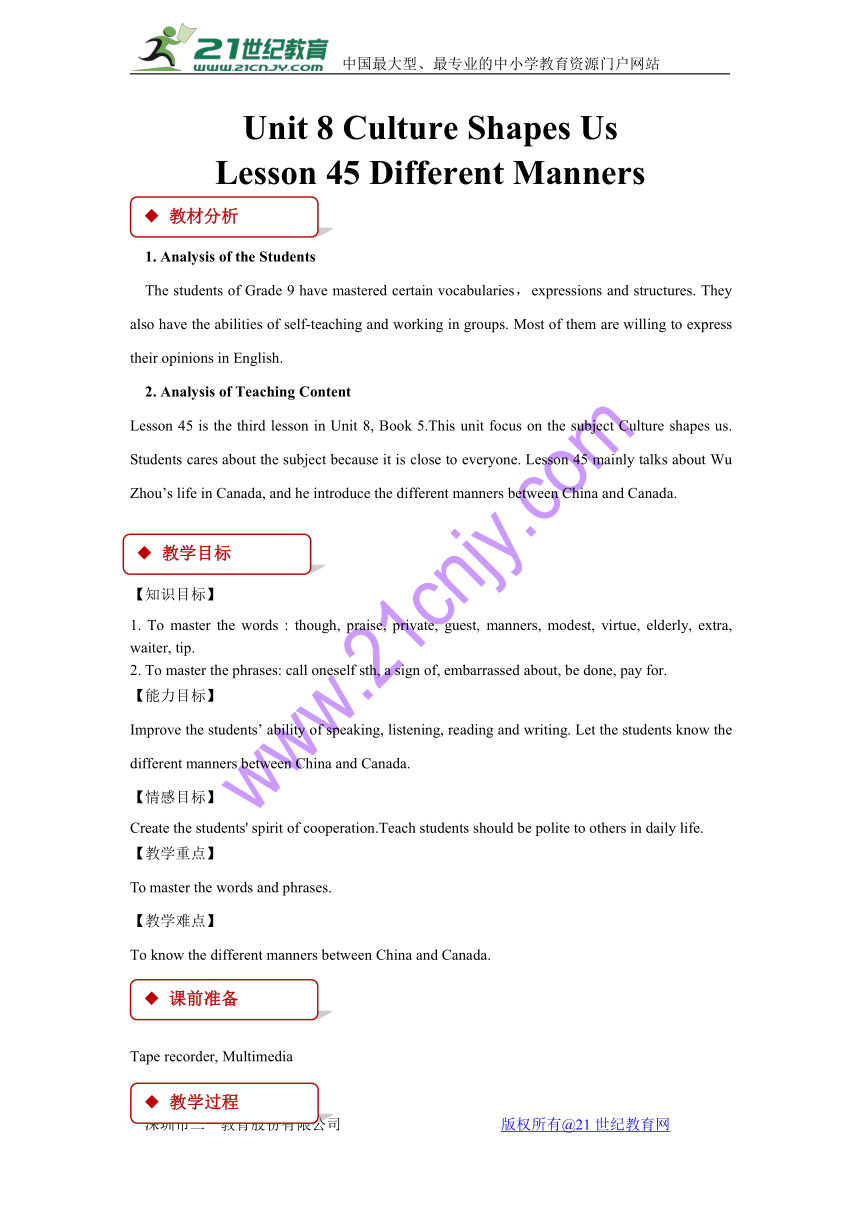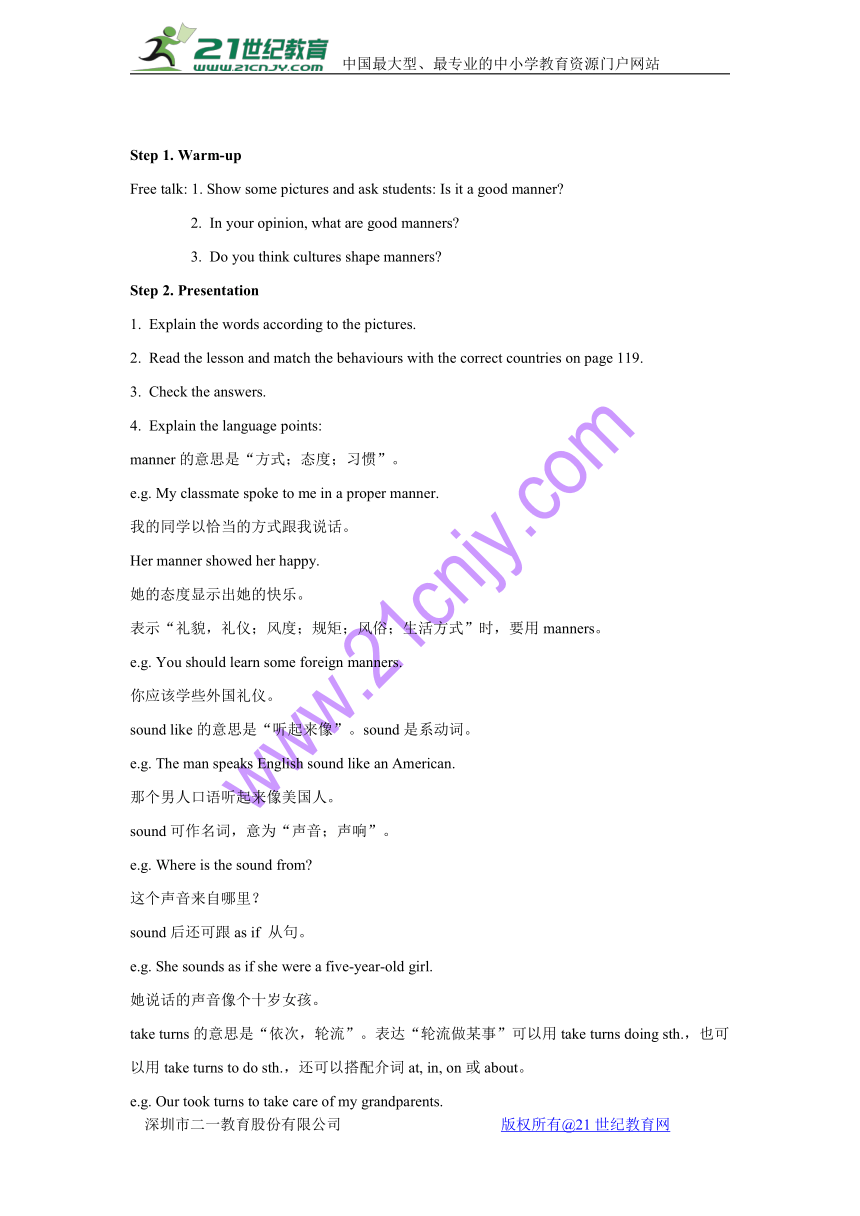Unit 8 Culture Shapes Us.Lesson 45 Different Manners. 教案
文档属性
| 名称 | Unit 8 Culture Shapes Us.Lesson 45 Different Manners. 教案 |  | |
| 格式 | zip | ||
| 文件大小 | 126.3KB | ||
| 资源类型 | 教案 | ||
| 版本资源 | 冀教版 | ||
| 科目 | 英语 | ||
| 更新时间 | 2018-04-06 20:05:34 | ||
图片预览


文档简介
Unit 8 Culture Shapes Us
Lesson 45 Different Manners
1. Analysis of the Students
The students of Grade 9 have mastered certain vocabularies,expressions and structures. They also have the abilities of self-teaching and working in groups. Most of them are willing to express their opinions in English.21*cnjy*com
2. Analysis of Teaching Content
Lesson 45 is the third lesson in Unit 8, Book 5.This unit focus on the subject Culture shapes us. Students cares about the subject because it is close to everyone. Lesson 45 mainly talks about Wu Zhou’s life in Canada, and he introduce the different manners between China and Canada.
【知识目标】
1. To master the words : though, praise, private, guest, manners, modest, virtue, elderly, extra, waiter, tip.21世纪教育网版权所有
2. To master the phrases: call oneself sth, a sign of, embarrassed about, be done, pay for.
【能力目标】
Improve the students’ ability of speaking, listening, reading and writing. Let the students know the different manners between China and Canada.21cnjy.com
【情感目标】
Create the students' spirit of cooperation.Teach students should be polite to others in daily life.
【教学重点】
To master the words and phrases.
【教学难点】
To know the different manners between China and Canada.21·cn·jy·com
Tape recorder, Multimedia
Step 1. Warm-up
Free talk: 1. Show some pictures and ask students: Is it a good manner?21教育网
In your opinion, what are good manners?
Do you think cultures shape manners?
Step 2. Presentation
Explain the words according to the pictures.
Read the lesson and match the behaviours with the correct countries on page 119.
Check the answers.
Explain the language points:
manner的意思是“方式;态度;习惯”。
e.g. My classmate spoke to me in a proper manner.
我的同学以恰当的方式跟我说话。
Her manner showed her happy.
她的态度显示出她的快乐。
表示“礼貌,礼仪;风度;规矩;风俗;生活方式”时,要用manners。
e.g. You should learn some foreign manners.
你应该学些外国礼仪。
sound like的意思是“听起来像”。sound是系动词。
e.g. The man speaks English sound like an American.2·1·c·n·j·y
那个男人口语听起来像美国人。
sound可作名词,意为“声音;声响”。
e.g. Where is the sound from?
这个声音来自哪里?
sound后还可跟as if 从句。
e.g. She sounds as if she were a five-year-old girl.2-1-c-n-j-y
她说话的声音像个十岁女孩。
take turns的意思是“依次,轮流”。表达“轮流做某事”可以用take turns doing sth.,也可以用take turns to do sth.,还可以搭配介词at, in, on或about。【来源:21·世纪·教育·网】
e.g. Our took turns to take care of my grandparents.【出处:21教育名师】
我们家人轮流照顾我的祖父母。
We take turns in cleaning the classrooms.
我们轮流打扫教室。
although, though引导的让步状语从句:
although是连词,相当于though,意为“虽然;即使;纵然”,引导让步状语从句。
需要注意的是,在汉语的表达中,我们经常会说,“尽管 / 虽然……,但是……”,而在英语中,although / though和but是不能同时使用的。但可以用yet 或 still 表然而,可是之意。【版权所有:21教育】
e.g. Though / Although it has been rain, (yet) we haven’t found an umbrella.
虽然下雨了,但是我们还没有找到雨伞。
praise sb. for sth. 因... ...赞扬某人。
eg. The teacher praised Mike for cleaning the window.21教育名师原创作品
因为麦克擦窗户,老师表扬了他。
Step 3. Practice
Listen and follow to the tape.
Match and complete the sentences.
Check the answers.
Fill in the blanks with the words or phrases in the box.21·世纪*教育网
pay for praise take turns modest private
We should ______ little Debbie for her courage.
It’s a long way. We can __________ driving.
They asked him to ________the damage, but he refused.【来源:21cnj*y.co*m】
Don’t talk about other people’s ________ things. It’s not polite.21*cnjy*com
Jack is a ________ man who is admired by many people.
Check the answers.
Fill in the blanks with the words or phrases in the box.
pay for praise take turns modest private
We should ______ little Debbie for her courage.
It’s a long way. We can __________ driving.
They asked him to ________the damage, but he refused.www-2-1-cnjy-com
Don’t talk about other people’s ________ things. It’s not polite.www.21-cn-jy.com
Jack is a ________ man who is admired by many people.
Check the answers.
Step 4. Consolidation
What cultural differences, besides the ones already discussed, have you noticed between China and English–speaking countries? Share your ideas with your classmates.
Write down the ideas.
Enjoy the story and tell us the saying: For the hard-working, a week has seven days; for the lazy, seven tomorrows.
Step5. Homework
1. Listen and read.
2. Finish exercises of this lesson.
略。
Lesson 45 Different Manners
1. Analysis of the Students
The students of Grade 9 have mastered certain vocabularies,expressions and structures. They also have the abilities of self-teaching and working in groups. Most of them are willing to express their opinions in English.21*cnjy*com
2. Analysis of Teaching Content
Lesson 45 is the third lesson in Unit 8, Book 5.This unit focus on the subject Culture shapes us. Students cares about the subject because it is close to everyone. Lesson 45 mainly talks about Wu Zhou’s life in Canada, and he introduce the different manners between China and Canada.
【知识目标】
1. To master the words : though, praise, private, guest, manners, modest, virtue, elderly, extra, waiter, tip.21世纪教育网版权所有
2. To master the phrases: call oneself sth, a sign of, embarrassed about, be done, pay for.
【能力目标】
Improve the students’ ability of speaking, listening, reading and writing. Let the students know the different manners between China and Canada.21cnjy.com
【情感目标】
Create the students' spirit of cooperation.Teach students should be polite to others in daily life.
【教学重点】
To master the words and phrases.
【教学难点】
To know the different manners between China and Canada.21·cn·jy·com
Tape recorder, Multimedia
Step 1. Warm-up
Free talk: 1. Show some pictures and ask students: Is it a good manner?21教育网
In your opinion, what are good manners?
Do you think cultures shape manners?
Step 2. Presentation
Explain the words according to the pictures.
Read the lesson and match the behaviours with the correct countries on page 119.
Check the answers.
Explain the language points:
manner的意思是“方式;态度;习惯”。
e.g. My classmate spoke to me in a proper manner.
我的同学以恰当的方式跟我说话。
Her manner showed her happy.
她的态度显示出她的快乐。
表示“礼貌,礼仪;风度;规矩;风俗;生活方式”时,要用manners。
e.g. You should learn some foreign manners.
你应该学些外国礼仪。
sound like的意思是“听起来像”。sound是系动词。
e.g. The man speaks English sound like an American.2·1·c·n·j·y
那个男人口语听起来像美国人。
sound可作名词,意为“声音;声响”。
e.g. Where is the sound from?
这个声音来自哪里?
sound后还可跟as if 从句。
e.g. She sounds as if she were a five-year-old girl.2-1-c-n-j-y
她说话的声音像个十岁女孩。
take turns的意思是“依次,轮流”。表达“轮流做某事”可以用take turns doing sth.,也可以用take turns to do sth.,还可以搭配介词at, in, on或about。【来源:21·世纪·教育·网】
e.g. Our took turns to take care of my grandparents.【出处:21教育名师】
我们家人轮流照顾我的祖父母。
We take turns in cleaning the classrooms.
我们轮流打扫教室。
although, though引导的让步状语从句:
although是连词,相当于though,意为“虽然;即使;纵然”,引导让步状语从句。
需要注意的是,在汉语的表达中,我们经常会说,“尽管 / 虽然……,但是……”,而在英语中,although / though和but是不能同时使用的。但可以用yet 或 still 表然而,可是之意。【版权所有:21教育】
e.g. Though / Although it has been rain, (yet) we haven’t found an umbrella.
虽然下雨了,但是我们还没有找到雨伞。
praise sb. for sth. 因... ...赞扬某人。
eg. The teacher praised Mike for cleaning the window.21教育名师原创作品
因为麦克擦窗户,老师表扬了他。
Step 3. Practice
Listen and follow to the tape.
Match and complete the sentences.
Check the answers.
Fill in the blanks with the words or phrases in the box.21·世纪*教育网
pay for praise take turns modest private
We should ______ little Debbie for her courage.
It’s a long way. We can __________ driving.
They asked him to ________the damage, but he refused.【来源:21cnj*y.co*m】
Don’t talk about other people’s ________ things. It’s not polite.21*cnjy*com
Jack is a ________ man who is admired by many people.
Check the answers.
Fill in the blanks with the words or phrases in the box.
pay for praise take turns modest private
We should ______ little Debbie for her courage.
It’s a long way. We can __________ driving.
They asked him to ________the damage, but he refused.www-2-1-cnjy-com
Don’t talk about other people’s ________ things. It’s not polite.www.21-cn-jy.com
Jack is a ________ man who is admired by many people.
Check the answers.
Step 4. Consolidation
What cultural differences, besides the ones already discussed, have you noticed between China and English–speaking countries? Share your ideas with your classmates.
Write down the ideas.
Enjoy the story and tell us the saying: For the hard-working, a week has seven days; for the lazy, seven tomorrows.
Step5. Homework
1. Listen and read.
2. Finish exercises of this lesson.
略。
同课章节目录
- Unit 7 Work for Peace
- Lesson 37 Don't Fight!
- Lesson 38 Making School a Better Place
- Lesson 39 The Dove and the Olive Branch
- Lesson 40 The UN—Power of Words
- Lesson 41 Jenny's Good Advice
- Lesson 42 Peace at Last
- Unit Review
- Unit 8 Culture Shapes Us
- Lesson 43 A Visit to Chinatown
- Lesson 44 Popular Sayings
- Lesson 45 Different Manners
- Lesson 46 Home to Many Cultures
- Lesson 47 Good Manners
- Lesson 48 Supper with the Bradshaws
- Unit Review
- Unit 9 Communication
- Lesson 49 Get Along with Others
- Lesson 50 Tips for Good Communication
- Lesson 51 What Could Be Wrong?
- Lesson 52 The Power of a Smile
- Lesson 53 Working in Groups
- Lesson 54 How Embarrassing!
- Unit Review
- Unit 10 Get Ready for the Future
- Lesson 55 Look into the Future
- Lesson 56 Manage Your Time
- Lesson 57 Best Wishes
- Lesson 58 Ms.Liu's Speech
- Lesson 59 Keep Your Choices Open
- Lesson 60 Get a Good Education
- Unit Review
